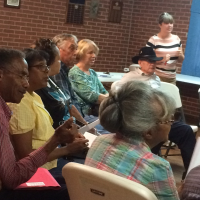UNC SRP helping NC communities become "Well Empowered"

The UNC SRP’s Research Translation Core, Projects 2 and 4, and several community partners, recently launched the Well Empowered initiative to aid communities around the state of North Carolina who may be impacted by toxic metals in private wells in documenting exposure to these toxicants and developing responses to reduce harmful exposures.
Following the Dan River coal ash spill in February 2014 and subsequent testing of private wells near coal ash impoundments around the state, residents of several communities received “do not drink” orders from state agencies, directing them not to consume their well water. When residents of these communities sought help in understanding well sampling results and the associated health implications, they reached out to UNC SRP for assistance.
“We pursued this partnership with UNC because we need data,” states Caroline Armijo of Stokes County’s Residents for Coal Ash Cleanup (RCAC), an affiliate organization of UNC SRP community partner Appalachian Voices. “We have all of these community stories, and we want trusted objective data that informs us about the toxic metals, particularly whether those metals are in our water and practical advice on how to stop the exposure and prevent illnesses.”
In North Carolina, a third of the state’s population (3.3 million residents) get their drinking water from private wells. UNC SRP research revealed in 2011 that a subset of private wells had concentrations of arsenic and other contaminants exceeding Safe Drinking Water Act (SDWA) standards, raising potential health concerns for the residents using these wells. Additionally, ongoing monitoring is not currently required for private wells in NC.

Community partners helped UNC RTC staff survey well owners in Stokes Co. Sunday, September 18.
The RTC developed Phase One of the study in partnership with two environmental nonprofits, a statewide coalition of impacted communities and local residents to better understand ways private well owners in these communities use their well water and how local issues influence their use of well water. Community partners helped UNC RTC staff survey well owners in Stokes Co. Sunday, September 18. Surveys were gathered at local churches, a RCAC meeting, and in area neighborhoods; staff will be in the area at several events over the next month to gather information from residents. RTC plans to expand the survey to other impacted communities in the state at a later date.
This is the first phase of a long-term prevention and intervention strategy focused on informing residents about potential exposure to toxic metals in well water and encouraging testing of private wells. The second phase will bring in scientists from Projects 2 (Dr. Rebecca Fry) and 4 (Dr. Avner Vengosh) who will begin sampling residents’ soil, well water and urine to better understand potential environmental exposures by documenting current levels of contaminants in and surrounding community homes.
Results from the survey and sampling will inform future trainings to prepare residents to understand their sampling results and implications for health as well as opportunities to reduce or eliminate exposure to these harmful contaminants.
